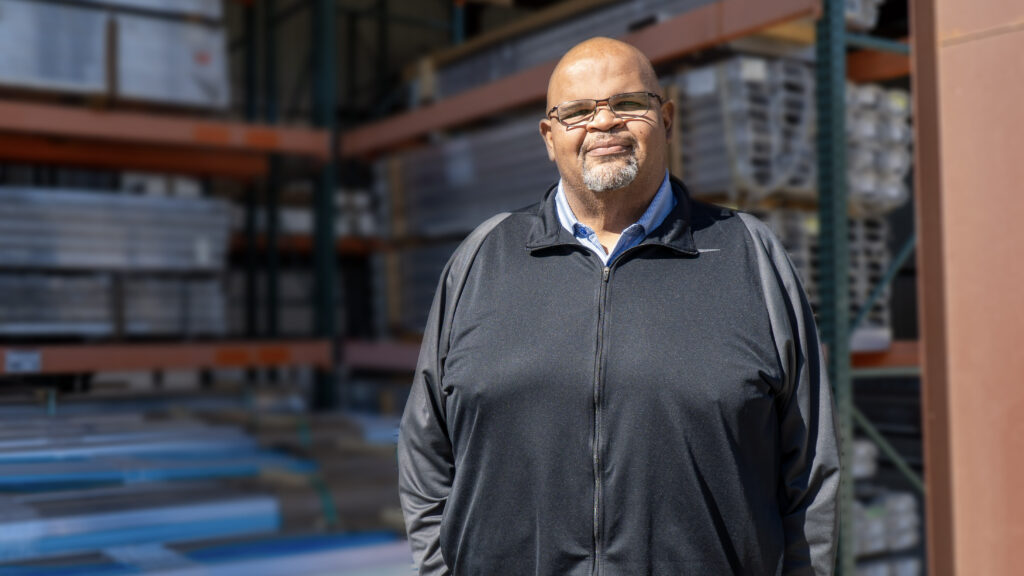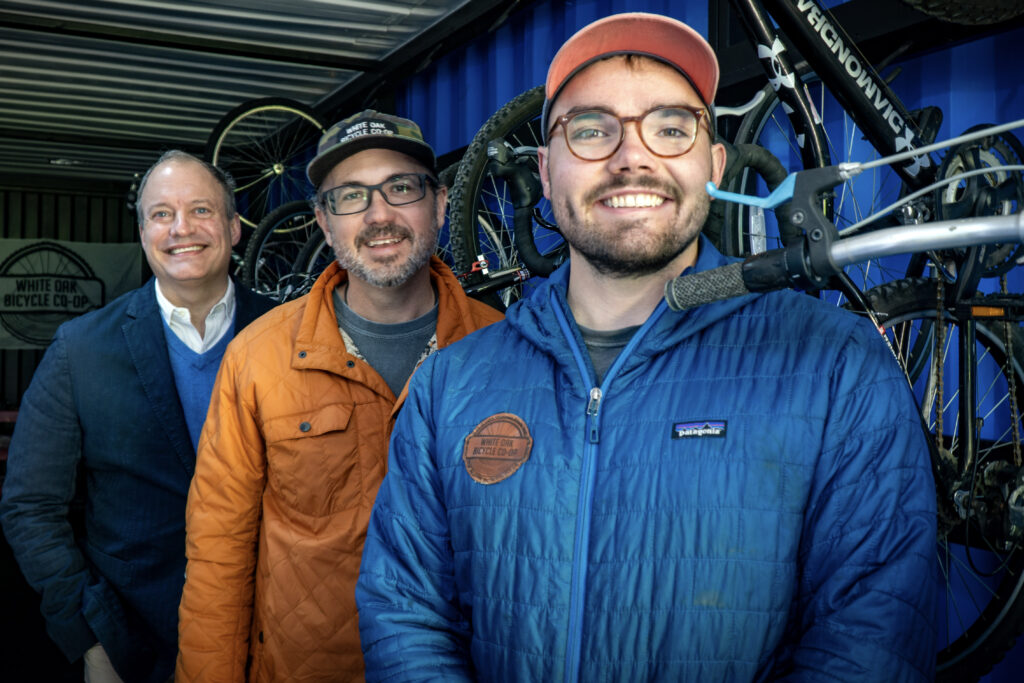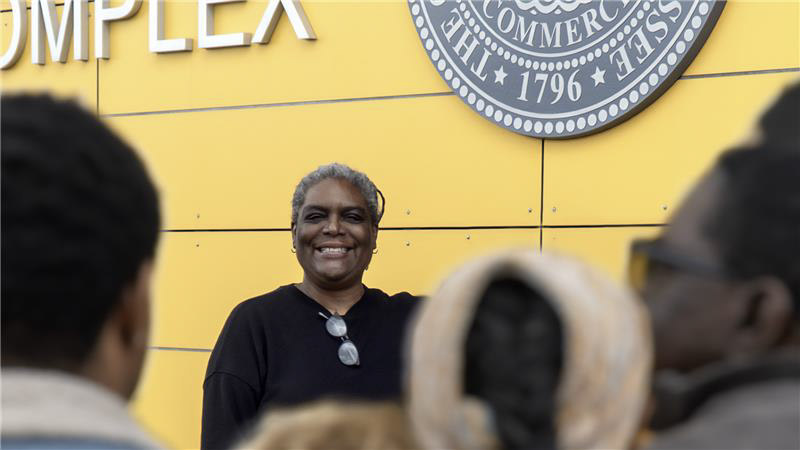April was National Second Chance Month, and Chattanooga businesses that support second-chance hiring are gaining well-deserved recognition for their quiet leadership in building a more inclusive workforce. Inspired by both the national initiative and Governor Bill Lee’s annual proclamation named April as “Second Chance Month” in Tennessee, Chattanooga Endeavors created the Second Chance Employer Declaration. Using Second Chance month as a platform to launch, the Declaration is an ongoing effort to honor local employers who believe that advancing opportunity, promoting fairness, and unlocking hidden potential in the workforce contribute meaningfully to the prosperity and social cohesion of the Chattanooga community.

The Declaration is not a contract or hiring requirement. Rather, it’s a values-based statement—offering businesses a way to demonstrate support for second chances, even if their policies or circumstances do not allow them to hire individuals with felony convictions.
A Community Value
Surveys conducted by Chattanooga Endeavors with the University of Tennessee at Chattanooga reveal that most area residents support second chances and believe that, with the right assistance, formerly incarcerated individuals can make meaningful contributions to society. However, despite this broad consensus, only four in ten employers report openly hiring individuals with a criminal record.
“Second-chance hiring isn’t about taking unwise risks,” says Tim Dempsey, Founding Director of Chattanooga Endeavors. “It’s about being reasonable about risks, supporting people who are ready to work, and creating a culture where opportunity is extended to those who need it most.”
Frequently, reluctance to consider candidates with felony convictions for hiring stems from inaccurate or incomplete information, as well as a general lack of familiarity with the criminal justice system. Through education and support, Chattanooga Endeavors equips employers with the knowledge and tools to adopt second-chance hiring practices in a way that both meet their staffing demands and benefit the broader community.
“We don’t hire people based on where they’ve been,” says Demetrius Russell, Director of Human Resources at United Enertech. “We hire for where they want to go.” This forward-looking approach is a cornerstone of effective second-chance hiring programs. Research indicates that individuals with criminal records often exhibit strong loyalty and performance when given employment opportunities. A study by SHRM. The Society for Human Resource Management, found that 85% of HR professionals and 81% of business leaders reported that employees with criminal records perform the same as or better than those without .
“If someone walks through our door with a strong work ethic and a desire to build a better future,” Russell points out, “that’s what matters. Everyone deserves a shot at a fresh start, and we’ve seen firsthand how powerful that chance can be.”

Why It Matters
Contrary to public opinion, the number of individuals under correctional supervision is getting smaller. According to the most current Tennessee Department of Correction’s Statistical Abstract, a decade ago, Tennessee prisons held 20,263 individuals. That number has decreased 4.7% to 19,305. Likewise, the number of people on parole, probation, or community corrections has also declined 5.3% from 66,093 to 62,581 over the same period.
Last year, an estimated 337 individuals—representing 3.46% of the total population released from Tennessee prisons—returned to Hamilton County. That’s about the capacity of the lower balcony at the Tivoli Theatre. In addition to those returning from prison, around 2,200 individuals in the county are on community corrections, probation, or parole at any given time.
The same is true nationally. Incarceration rates have been falling for decades and are now at their lowest since 1995, according to a report by the Pew Research Center.
No matter the statistics, anyone who has served time in prison will testify that reentry is rarely simple. It involves navigating a complex web of challenges such as housing instability, limited access to healthcare, transportation hurdles, digital illiteracy and lack of connectivity, social stigma, and employment discrimination. These barriers and others make long-term stability extraordinarily difficult to achieve.
While some individuals return with limitations such as advanced age or disabilities that may restrict their ability to work, the vast majority are qualified, motivated, and eager to contribute. For them, employment—especially jobs that provide a pathway to a living wage—can become the cornerstone of successful reentry.
When reentry works, it doesn’t just benefit the individual. It strengthens families, enhances public safety, and contributes to a more resilient local economy.

Unlocking Talent, Fueling Growth
Employers that develop thoughtful second-chance hiring programs often see measurable business benefits—including a more loyal and motivated workforce, lower turnover, and eligibility for financial incentives like the Work Opportunity Tax Credit (WOTC). These advantages become even more significant as communities across Tennessee look for long-term solutions to workforce gaps and labor shortages.
“To ensure a comprehensive workforce system,” notes Michele Holt, Executive Director of Southeast Tennessee Local Workforce Development Board, “we must recognize the value of second chances. When individuals are given the opportunity to rebuild and contribute, we not only change lives—we meet real business needs and strengthen our regional economy.”
In Tennessee, projections from the Department of Labor and Workforce Development forecast a tightening labor market across several key industries—especially in healthcare, manufacturing, and logistics. The state projects more than 350,000 new job openings by 2030, with employers already struggling to fill key roles as the population ages and participation rates stagnate. These trends make it even more critical to tap into overlooked talent pools—including individuals reentering the workforce after incarceration. Embracing second-chance hiring not only meets immediate workforce needs but also helps employers build more resilient and values-driven workplaces for the long term.
“The National Society for Human Resource Management (SHRM) has been a longstanding advocate for second-chance hiring,” according to Deborah Duncan, president of the organization’s Southeast Tennessee chapter. In 2018, SHRM partnered with the Charles Koch Institute to conduct groundbreaking research on the employment of individuals with criminal histories. This initiative culminated in the 2021 Getting Talent Back to Work report, which offers practical guidance for hiring and working with justice-involved individuals. As Duncan points out, the report found that “85 percent of HR leaders and 81 percent of business leaders said second-chance hires perform the same as or better than other employees.” Additional findings highlight that hiring returning citizens can help reduce employee turnover while increasing overall workforce participation.
Benefits of Signing the Declaration
“There’s no shortage of information out there,” said Wade Hinton, founder of Hinton & Company and former Chief Inclusion Officer at Unum, “but what we’re often missing is structured training that equips hiring managers with evidence-based practices. We are eager to work with Chattanooga Endeavors and SHRM to develop training that will build the capacity of our local workforce to create legitimate second chances—with real benefits for individuals, employers, and the broader community.”
Continuing education programs—developed in partnership with the local SHRM chapter—will launch this fall to help HR professionals, general managers, and business leaders across the community build sustainable hiring practices that generate long-term value. To encourage participation and reinforce key concepts, Second Chance Employer Declaration signers receive exclusive access to Employer Connections, Chattanooga Endeavors’ quarterly bulletin. Focused on actionable strategies, the publication explores topics such as inclusive hiring, tax incentives, employee retention, onboarding, and addressing stigma. Reserved exclusively for declaration signatories, Employer Connections is designed to be a lasting resource that supports and strengthens their commitment to second-chance hiring.
In addition, signers receive a welcome kit with customizable marketing materials to help them share their support in ways that align with their brand identity, company culture, and business strategy—further embedding their commitment into everyday operations and messaging.
From Commitment to Change: How Employers Are Making It Work
For employers looking to launch or strengthen a second-chance program, Chattanooga Endeavors offers guidance on adopting supportive policies grounded in national best practices—ranging from identifying second-chance candidate sources and working within existing staffing relationships to partnering with local service organizations, setting new hires up for success, tracking impact, and maximizing available incentives and savings.
“With 35 years of experience helping people succeed after incarceration, Chattanooga Endeavors has built an exceptionally knowledgeable second-chance team,” says David Chalker, who returned to Chattanooga after a successful career in the banking industry in Washington, D.C. to lead the organization as Executive Director. “Our team is uniquely positioned to support businesses exploring second-chance hiring in meaningful and sustainable ways.”
He points to Ardena Garth Hicks, the first and longest-serving Public Defender of Hamilton County, whose decades-long legal career has given her deep insight into the human and systemic challenges of reentry. Chalker also highlights the contribution of Tim Dempsey, whose work in prison outreach began in 1987 when he spent a year living in a halfway house at the University of Notre Dame. Dempsey went on to help launch Hamilton County’s first reentry program, developed one of Tennessee’s earliest work-readiness curricula, pioneered staffing models as a reentry strategy, and led a city-wide human services reform initiative in Milwaukee.
The team is further strengthened by seasoned human resource professionals who bring critical expertise in inclusive employment practices and real-world business strategy.
Keeping the Momentum Going
Chattanooga Endeavors is dedicated to advancing the second-chance movement by equipping local employers with the tools, training, and tailored support they need to build meaningful programs that foster opportunity, fairness, and the realization of human potential. Beyond the workforce, the organization also conducts events and initiatives that bring together community members to exchange ideas, highlight success stories, and celebrate the life-changing impact of second chances. These events also offer opportunities for businesses to get involved—by sponsoring, attending, or lending support to second-chance efforts.
Creating and sustaining second-chance opportunities requires more than just hiring policies—it takes a cultural shift that engages the broader community. One powerful tool in making that shift is honest, inclusive conversation.
As the first and longest-serving Public Defender of Hamilton County, Ardena Garth Hicks has seen firsthand how deeply public attitudes can affect the lives of people returning from incarceration. Reflecting on the community-wide impact of second-chance initiatives, she notes that “when we create space for community dialogue, we make it possible to challenge value-destroying stereotypes and dismantle the biases that isolate people from opportunity. That is why this effort is so important—not just as a workforce strategy, but as a commitment to human dignity.”

Through ongoing dialogue, initiatives like the Second Chance Employer Declaration help reshape narratives and replace stigma with understanding. and replace stigma with understanding. They build trust between employers, jobseekers, and the broader community—laying the foundation for a more just and prosperous Chattanooga.
About Chattanooga Endeavors
Established in 1988, Chattanooga Endeavors is a nonprofit organization dedicated to helping individuals from Hamilton County who are serving time in a state or federal prison make the most of their incarceration experience and return to society with dignity and purpose. Over the years, the organization has pioneered a variety of reentry initiatives, including the region’s first halfway house, its first work readiness training program, and one of the nation’s first alternative staffing ventures focused exclusively on second chances. Today, in addition to maintaining contact with every individual from Hamilton County serving time in a Tennessee prison, Chattanooga Endeavors supports those returning to the area with disabilities that prevent them from working, while partnering with employers to improve policies, practices, and workplace cultures that make second-chance employment more viable, inclusive, and impactful for those who are ready and able to work.
Join the Movement: How Your Business Can Make a Difference
Signing the Second Chance Employer Declaration is simple—and there is no cost whatsoever for participating businesses. Companies can learn more at chattanoogaendeavors.org/declaration.
April is not just a time for recognition—it marks the start of a sustained call to leadership. Employers who prioritize community safety, workforce stability, and expanding opportunity are invited to sign the declaration or begin the conversation—whether during Second Chance Month or at a time that best aligns with their business goals.
“When we say YES to second chances,” as Dempsey puts it, “we say YES to stronger businesses, a stronger workforce, and a stronger Chattanooga.”
For more information, visit chattanoogaendeavors.org or contact David Chalker at (202) 560-4740.








